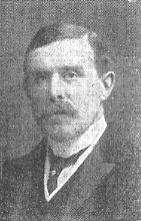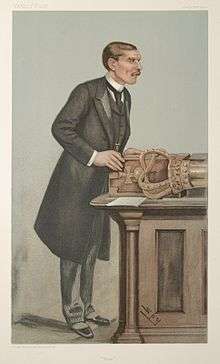St John Brodrick, 1st Earl of Midleton
| The Right Honourable The Earl of Midleton KP PC DL | |
|---|---|
 | |
| Secretary of State for War | |
|
In office 12 November 1900 – 12 October 1903 | |
| Monarch |
Victoria Edward VII |
| Prime Minister |
The Marquess of Salisbury Arthur Balfour |
| Preceded by | The Marquess of Lansdowne |
| Succeeded by | H. O. Arnold-Forster |
| Secretary of State for India | |
|
In office 9 October 1903 – 4 December 1905 | |
| Monarch | Edward VII |
| Prime Minister | Arthur Balfour |
| Preceded by | Lord George Hamilton |
| Succeeded by | John Morley |
| Leader of the Irish Unionist Alliance | |
|
In office 1910–1919 | |
| Preceded by | Sir Edward Carson |
| Succeeded by | Lord Farnham |
| Personal details | |
| Born | 14 December 1856 |
| Died | 13 February 1942 (aged 85) |
| Nationality | British |
| Political party |
Conservative (until 1891) Irish Unionist Alliance (1891-1919) Unionist Anti-Partition League (1919-1922) |
| Spouse(s) |
(1) Lady Hilda Charteris (d. 1901) (2) Madeleine Stanley |
| Alma mater | Balliol College, Oxford |

William St John Fremantle Brodrick, 1st Earl of Midleton, KP PC DL (14 December 1856 – 13 February 1942), known as St. John Brodrick until 1907 and as The Viscount Midleton between 1907 and 1920, was a British Conservative Party and Irish Unionist Alliance politician.
Background and education
He came of a Surrey family who in the 17th century, in the persons of Sir St John Brodrick and Sir Thomas Brodrick, obtained grants of land in the south of Ireland. Sir St John Brodrick settled at Midleton, between Cork and Youghal in 1641; and his son Alan Brodrick (1660–1728), Speaker of the Irish House of Commons and Lord Chancellor of Ireland, was created Baron Brodrick in 1715 and Viscount Midleton in 1717 in the Irish peerage.
In 1796 the title of Baron Brodrick in the Peerage of Great Britain was created. The English family seat at Peper Harrow, near Godalming, Surrey, was designed by Sir William Chambers. The 8th Viscount Midleton was a conservative in politics, who for a few years had a seat in the House of Commons, and who was responsible in the House of Lords for carrying the Infants Protection Act. He was educated at Eton and Balliol College, Oxford, where he served as president of the Oxford Union.
Political career
Brodrick entered Parliament as Conservative member for West Surrey in 1880.[1]
In 1883 he was appointed to a Royal Commission examining the condition of Irish prisons.[2] He was Financial Secretary to the War Office 1886-92; Under-Secretary of State for War, 1895–1898; Parliamentary Under-Secretary of State for Foreign Affairs, 1898–1900; Secretary of State for War, 1900–1903;[3][4][5] and Secretary of State for India, 1903-05.
In 1904, during a crisis in British relations with Russia, he became the first member of a Cabinet since 1714 to attend a meeting of the Privy Council without being summoned to it by the monarch.[6] At the general election of January 1906, the outcome of which was a Liberal landslide (the biggest at a British general election between 1832 and 1945), he lost his Parliamentary seat, at Guildford, which he had held since 1885.[7][8][9][10] In March 1907 he was made an alderman of the London County Council.
From 1910 he was regarded as the nominal leader of the Irish Unionist Alliance (IUA) in Southern Ireland, while Sir Edward Carson led the party in Ulster (the Ulster Unionist Council). He was a remote and condescending leader who relied on a few intimates and was suspected of being more interested in a future career in British conservative politics than in his Irish followers. In 1916 Midleton's lobbying helped to defeat an attempt to implement immediate Home Rule with Ulster exclusion; this was supported by the Ulster leader Edward Carson and the Home Ruler John Redmond, but Midleton believed it would be disastrous for the Southern Unionist minority.
In 1918, during the Irish Convention, Midleton tried to reach a compromise with Redmond which would allow Home Rule without partition subject to certain financial restrictions. This was rejected both by Redmond's followers (who saw it as too restrictive) and the hardline IUA rank-and-file, who deposed Midleton. He and his followers then formed the Unionist Anti-Partition League, an elite body mainly concerned with lobbying. It had some influence on the 1920 Government of Ireland Act, but none of the safeguards for Southern Unionist interests which it sought were included in the 1921 Anglo-Irish Treaty. Successful lobbying by Midleton and associated Southern Unionists was instrumental in ensuring their representation in the Seanad of the Irish Free State.[11]
Honours and awards
In the 1920 New Year Honours, was created Earl of Midleton,[12] a title that became extinct with the death of his son in 1979.
He received the Honorary Freedom and was appointed a Liveryman of the Worshipful Company of Broderers in 1902, his family having been associated with the company since the early 17th century.[13]
Family
He married, first in 1880, Lady Hilda (died 1901), daughter of The 10th Earl of Wemyss, by whom he had five children, including George Brodrick, 2nd Earl of Midleton; and secondly in 1903, Madeleine Stanley, daughter of The Baroness St Helier by her first husband.
His sister, the Honourable Marian Cecilia Brodrick, married Sir James Whitehead, son of the inventor Robert Whitehead. Sir James Whitehead was to become the British Ambassador to Austria, and his daughter Agathe was the first wife of Georg Johannes von Trapp; the story of their children and his second wife, Maria von Trapp, was the basis of the musical The Sound of Music. Another sister, Albinia, became an early supporter of Sinn Féin and became well known in Ireland under the name Gobnait Ní Bhruadair.
His grandson Sir Julian St. John Loyd (by his daughter, Lady Moyra Brodrick) became land agent to Queen Elizabeth II at Sandringham. Julian's daughter, Alexandra (Mrs Duncan Byatt), was a Lady-in-Waiting to Diana, Princess of Wales.[14]
Footnotes
- ↑ "House member declaration" (PDF). London Gazzette. London, UK. London Gazzette. 6 April 1880. p. 2388. Archived from the original on 3 September 2014. Retrieved 3 September 2014.
- ↑ "House of Lords news summaries" (pdf). The London Gazzette. 2 January 1883. pp. 29–30. Archived from the original on 3 September 2014. Retrieved 11 January 2008.
- ↑ The London Gazette: no. 27246. p. 6923. 13 November 1900. Retrieved 11 January 2008.
- ↑ The London Gazette: (Supplement) no. 27272. p. 552. 24 January 1901. Retrieved 11 January 2008.
- ↑ The London Gazette: no. 27273. p. 558. 25 January 1901. Retrieved 11 January 2008.
- ↑ Sir Almeric Fitzroy, Memoirs (London & New York, 1925), vol. I, p. 222.
- ↑ The London Gazette: no. 25609. p. 3495. 20 July 1886. Retrieved 11 January 2008.
- ↑ The London Gazette: no. 26311. p. 4311. 29 July 1892. Retrieved 11 January 2008.
- ↑ The London Gazette: no. 26651. p. 4485. 9 August 1895. Retrieved 11 January 2008.
- ↑ The London Gazette: no. 27244. p. 6774. 6 November 1900. Retrieved 11 January 2008.
- ↑ Provost of Trinity College to Middleton PRO 30/67 , Middleton Papers, National Archives, Kew, London.
- ↑ The London Gazette: (Supplement) no. 31712. p. 1. 30 December 1919. Retrieved 10 January 2008.
- ↑ "Court Circular". The Times (36731). London. 2 April 1902. p. 7.
- ↑ "Yvonne's Royalty Home Page: Diana, Princess of Wales' Ladies-in-Waiting". Archived from the original on 4 September 2014. Retrieved 4 September 2014.
References
- Atkins, W B; Matthew, H C G (2008) [2004]. "'Brodrick, (William) St John Fremantle, first Earl of Midleton (1856–1942)'". Oxford Dictionary of National Biography. Oxford University Press. doi:10.1093/ref:odnb/32085. Retrieved 11 January 2008. (subscription required (help)).
- Obituary, The Times, 16 February 1942
-
 This article incorporates text from a publication now in the public domain: Chisholm, Hugh, ed. (1911). "article name needed". Encyclopædia Britannica (11th ed.). Cambridge University Press.
This article incorporates text from a publication now in the public domain: Chisholm, Hugh, ed. (1911). "article name needed". Encyclopædia Britannica (11th ed.). Cambridge University Press. - Leigh Rayment's Peerage Pages
- Leigh Rayment's Historical List of MPs
External links
| Wikimedia Commons has media related to St John Brodrick, 1st Earl of Midleton. |
- Hansard 1803–2005: contributions in Parliament by the Earl of Midleton
| Parliament of the United Kingdom | ||
|---|---|---|
| Preceded by Lee Steere George Cubitt |
Member of Parliament for West Surrey 1880–1885 With: George Cubitt |
Constituency abolished |
| Preceded by Denzil Roberts Onslow |
Member of Parliament for Guildford 1885–1906 |
Succeeded by William Henry Cowan |
| Political offices | ||
| Preceded by The Lord Monkswell |
Under-Secretary of State for War 1895–1898 |
Succeeded by George Wyndham |
| Preceded by Hon. George Curzon |
Under-Secretary of State for Foreign Affairs 1898–1900 |
Succeeded by Viscount Cranborne |
| Preceded by The Marquess of Lansdowne |
Secretary of State for War 1900–1903 |
Succeeded by H. O. Arnold-Forster |
| Preceded by Lord George Hamilton |
Secretary of State for India 1903–1905 |
Succeeded by John Morley |
| Peerage of Ireland | ||
| Preceded by William Brodrick |
Viscount Midleton 1907–1942 |
Succeeded by George St John Brodrick |
| Peerage of the United Kingdom | ||
| New creation | Earl of Midleton 1920–1942 |
Succeeded by George St John Brodrick |